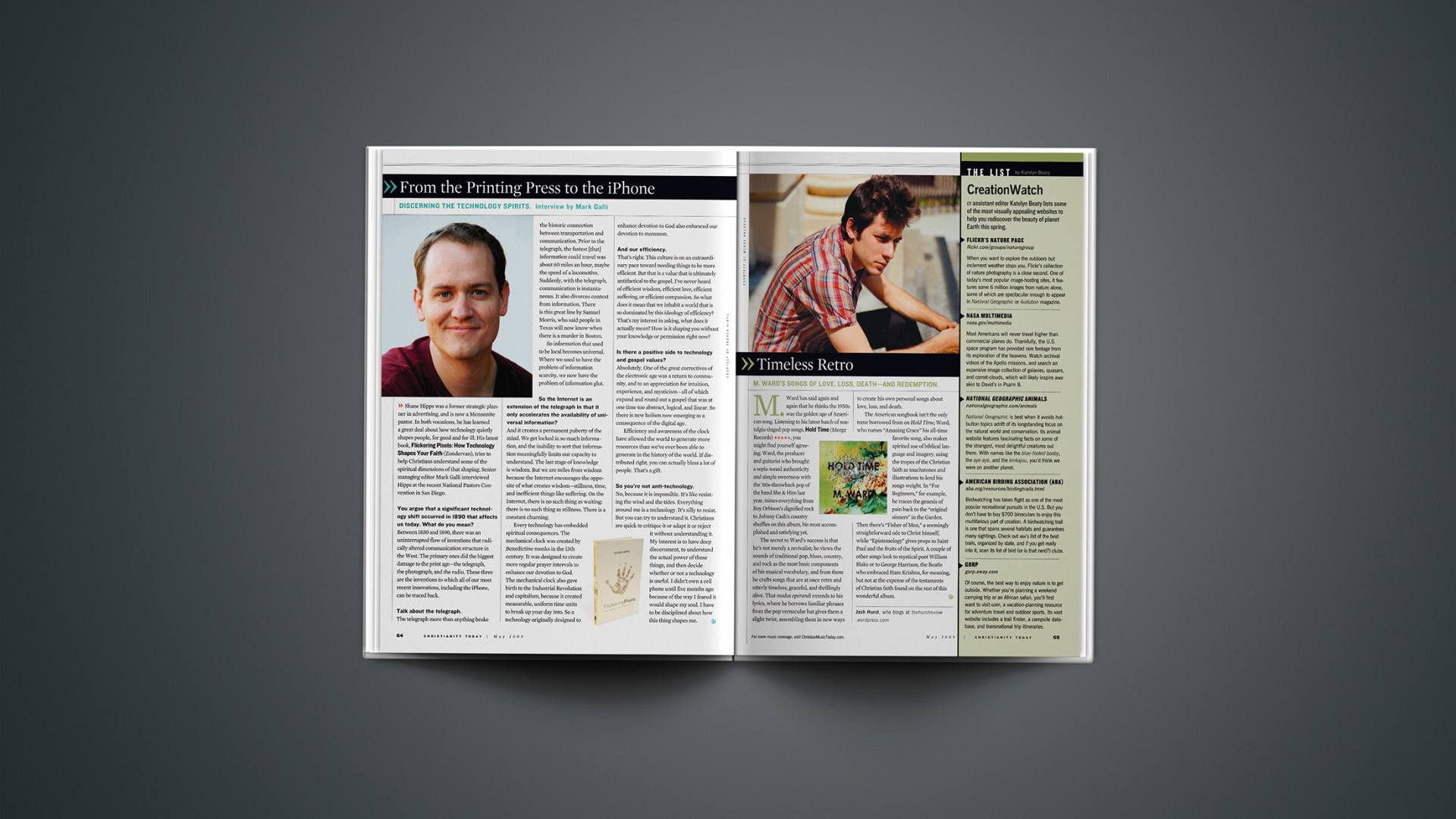Shane Hipps was a former strategic planner in advertising, and is now a Mennonite pastor. In both vocations, he has learned a great deal about how technology quietly shapes people, for good and for ill. His latest book, Flickering Pixels: How Technology Shapes Your Faith (Zondervan), tries to help Christians understand some of the spiritual dimensions of that shaping. Senior managing editor Mark Galli interviewed Hipps at the recent National Pastors Convention in San Diego.
You argue that a significant technology shift occurred in 1890 that affects us today. What do you mean?
Between 1850 and 1890, there was an uninterrupted flow of inventions that radically altered communication structure in the West. The primary ones did the biggest damage to the print age—the telegraph, the photograph, and the radio. These three are the inventions to which all of our most recent innovations, including the iPhone, can be traced back.
Talk about the telegraph.
The telegraph more than anything broke the historic connection between transportation and communication. Prior to the telegraph, the fastest [that] information could travel was about 60 miles an hour, maybe the speed of a locomotive. Suddenly, with the telegraph, communication is instantaneous. It also divorces context from information. There is this great line by Samuel Morris, who said people in Texas will now know when there is a murder in Boston.
So information that used to be local becomes universal. Where we used to have the problem of information scarcity, we now have the problem of information glut.
So the Internet is an extension of the telegraph in that it only accelerates the availability of universal information?
And it creates a permanent puberty of the mind. We get locked in so much information, and the inability to sort that information meaningfully limits our capacity to understand. The last stage of knowledge is wisdom. But we are miles from wisdom because the Internet encourages the opposite of what creates wisdom—stillness, time, and inefficient things like suffering. On the Internet, there is no such thing as waiting; there is no such thing as stillness. There is a constant churning.
Every technology has embedded spiritual consequences. The mechanical clock was created by Benedictine monks in the 13th century. It was designed to create more regular prayer intervals to enhance our devotion to God. The mechanical clock also gave birth to the Industrial Revolution and capitalism, because it created measurable, uniform time units to break up your day into. So a technology originally designed to enhance devotion to God also enhanced our devotion to mammon.
And our efficiency.
That’s right. This culture is on an extraordinary pace toward needing things to be more efficient. But that is a value that is ultimately antithetical to the gospel. I’ve never heard of efficient wisdom, efficient love, efficient suffering, or efficient compassion. So what does it mean that we inhabit a world that is so dominated by this ideology of efficiency? That’s my interest in asking, what does it actually mean? How is it shaping you without your knowledge or permission right now?
Is there a positive side to technology and gospel values?
Absolutely. One of the great correctives of the electronic age was a return to community, and to an appreciation for intuition, experience, and mysticism—all of which expand and round out a gospel that was at one time too abstract, logical, and linear. So there is new holism now emerging as a consequence of the digital age.
Efficiency and awareness of the clock have allowed the world to generate more resources than we’ve ever been able to generate in the history of the world. If distributed right, you can actually bless a lot of people. That’s a gift.
So you’re not anti-technology.
No, because it is impossible. It’s like resisting the wind and the tides. Everything around me is a technology. It’s silly to resist. But you can try to understand it. Christians are quick to critique it or adapt it or reject it without understanding it. My interest is to have deep discernment, to understand the actual power of these things, and then decide whether or not a technology is useful. I didn’t own a cell phone until five months ago because of the way I feared it would shape my soul. I have to be disciplined about how this thing shapes me.
Copyright © 2009 Christianity Today. Click for reprint information.
Related Elsewhere:
Flickering Pixels is available from ChristianBook.com and other book retailers. Zondeveran has an excerpt.
Shane Hipps’s website has more information about the author and his book. His sermons are available at the website of his church, Trinity Mennonite. He also blogs and podcasts at Third Way Faith.
Rob Bell interviewed Hipps at the National Pastors Convention.










